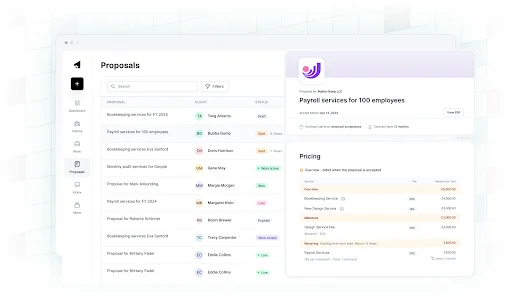In the coaching industry, whether you’re a life coach, executive coach, or career coach, presenting a professional proposal is an essential part of securing clients. A coaching proposal template allows coaches to clearly define their services, pricing, and approach, helping potential clients understand the value you offer. In this article, we’ll explore why having a solid coaching proposal is crucial, what key elements should be included in the template, and how it can enhance your coaching business’s credibility.
Why You Need a Coaching Proposal Template
A well-crafted coaching proposal not only sets expectations but also helps establish a professional relationship from the very first interaction. It offers clients a clear understanding of what they can expect from your coaching services, the outcomes they should aim for, and how you will help them achieve their goals.
A coaching proposal template makes the process of writing proposals much more efficient. Instead of creating a proposal from scratch each time, you can customize a template to fit each client’s needs, ensuring consistency across all your proposals. This is especially important for coaches managing multiple clients or projects at once. With a solid template, you can ensure that every proposal includes the critical components necessary to make a strong impression.
Not only does it save time, but a proposal template also ensures that you don’t miss any important details. Whether it’s your coaching methodology, expected timelines, or payment terms, a template makes sure you cover all the essential elements, leaving little room for confusion or miscommunication.
Key Elements of a Coaching Proposal Template
A coaching proposal template should include several key elements to ensure that it communicates your services clearly and effectively. Below are the essential components every coaching proposal should contain:
Introduction and Background: Start the proposal with a personal introduction, explaining who you are and what type of coaching you offer. This section should also provide a brief background of your experience and credentials to build credibility with the client. Clients want to know why you’re the right fit for their needs, so it’s important to establish your expertise here.
Client’s Goals and Challenges: Demonstrate that you understand the client’s unique goals and challenges. A good proposal will reflect that you’ve taken the time to learn about the client’s situation and are tailoring your services to meet their specific needs. This section should briefly summarize their current challenges and your proposed solutions.
Coaching Approach and Methodology: Describe the coaching methods you use and how you will help your client achieve their goals. This section could include the types of coaching sessions you offer (e.g., one-on-one, group coaching), your coaching philosophy, and any tools or resources you use during your sessions.
Coaching Plan and Timeline: Clearly outline the coaching plan, including the number of sessions, frequency of sessions, and the expected timeline for achieving specific goals. A well-defined timeline helps the client know what to expect and sets realistic expectations for both parties.
Pricing and Payment Terms: Clearly define your pricing structure in the proposal. Include your rates for coaching sessions, packages, or other services you provide. Additionally, outline the payment terms, such as the deposit amount, payment methods, and due dates.
Expected Outcomes and Results: This section should focus on the potential outcomes your client can expect from your coaching program. Be specific about the results your client can anticipate, whether it’s improving productivity, achieving career milestones, or personal growth.
Client Testimonials or Case Studies: Include any relevant testimonials or case studies that can reinforce your credibility and demonstrate your past success. Positive reviews from previous clients can significantly impact a potential client’s decision-making process, as it shows proof of your effectiveness as a coach.
Terms and Conditions: Outline any legal terms, such as cancellation policies, confidentiality agreements, or other contractual obligations. This section should protect both you and your client and ensure both parties are clear on the terms of the coaching relationship.
Call to Action: End the proposal with a clear call to action, encouraging the client to take the next step. This could be scheduling an introductory consultation, signing the proposal, or contacting you with any further questions.
Best Coaching Proposal Software: Streamlining the Proposal Process
Creating a professional coaching proposal can be much simpler and quicker when you use coaching proposal software. Many software options offer customizable templates and tools that help coaches create, send, and track proposals. Below are some of the best coaching proposal software solutions:
Cone
Cone offers customizable coaching proposal templates, making it easy to tailor your proposals for each client. It also includes tracking features, so you’ll know when your client has viewed or signed the proposal, helping you follow up at the right time.
Sage Intacct Accountants Program
While designed for accountants, Sage Intacct also offers great features for coaches who want to manage both proposals and accounting in one platform. It allows you to generate proposals, manage contracts, and keep track of payments, all integrated with your business finances.
Karbon
Karbon is an excellent choice for coaches who need both proposal templates and project management tools. Its proposal templates can be easily customized, and you can also track client communication and workflow from within the platform, ensuring smooth client management.
Jetpack Workflow
This software offers a simple yet effective way to create professional proposals for coaches. You can create proposals using ready-to-go templates, customize them for each client, and keep track of important client interactions all in one place.
Canopy
Canopy’s coaching proposal management tool helps coaches create and send professional proposals quickly. The software allows for customization, including adding pricing packages, services, and client-specific details, making each proposal feel personal and unique.
TaxDome
TaxDome allows coaches to create proposals and manage client relationships in one platform. You can customize your proposals, track client engagement, and even automate parts of the process, saving you time and helping you stay organized.
Aero Workflow
Aero Workflow is an all-in-one solution that offers customizable proposal templates, project management features, and client management tools, all in a user-friendly interface. It’s ideal for coaches who need to manage multiple clients simultaneously.
Financial Cents
This software is designed to help coaches stay organized while managing proposals, deadlines, and client expectations. Financial Cents offers customizable proposal templates, making it easy to deliver professional proposals quickly.
Pixie
Pixie is a client management tool that includes proposal templates tailored for coaches. You can customize proposals, keep track of client progress, and ensure all paperwork is organized and stored securely in one platform.
Mango Practice Management
Mango helps coaches manage both proposals and client communications. It includes easy-to-use templates for creating proposals, as well as tools to track progress and keep clients engaged throughout the coaching process.
Firm360
Firm360 offers a streamlined proposal creation process along with project and client management tools. With its customizable templates, you can quickly generate professional proposals tailored to each client’s needs.
Senta
Senta provides proposal software that’s ideal for coaches, enabling you to create personalized proposals, manage client communications, and track progress all in one platform. It’s a great solution for coaches looking for efficiency and simplicity.
Simplify Your Coaching Business with a Professional Proposal Template
A coaching proposal template is an invaluable tool for any coach looking to streamline their proposal process and present their services in a professional and organized manner. By including key elements like your coaching approach, pricing structure, and expected outcomes, you ensure that clients know exactly what to expect.
Using coaching proposal software, such as Cone, Karbon, and Canopy, allows you to create customized, professional proposals quickly and efficiently. These software solutions not only make the proposal creation process easier but also help you manage client relationships, making your coaching business more organized and effective.
Investing time in creating a strong coaching proposal template and using the right software can enhance your client interactions and set the stage for successful coaching relationships. Whether you’re a life coach, executive coach, or any other type of coach, a polished proposal is an essential part of your business success.





